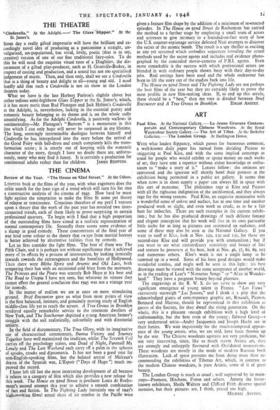"Cinderella." At the Adelphi.--. The Glass Slipper." At the St.
James's.
SOME day a really gifted impresario will have the brilliant and ex- ceedingly novel idea of producing as a pantomime a straight, un- vulgarised, un-popularised, but vivid, lively, poetic (that is to say, creative) version of one of our fine traditional fairy-tales. To do this he will need the exquisite visual taste of a Diaghilev, the dis- cernment of a gifted play-producer, such as H. Granville-Barker, in respect of casting and production, and a sound but not too specialised judgement of music. Then, and then only, shall we see a Cinderella that is a thing of beauty and delight to all—young and old. I need hardly add that such a Cinderella is not on show in the London theatres today.
What we have is the late Herbert Farjeon's slightly clever but rather tedious semi-highbrow Glass Slipper at the St. James's, which, if it has more merit than Bud Flanagan and Jack Hylton's Cinderella at the Adelphi, is, nevertheless, lacking in the essential poetry and romantic beauty belonging to its theme and is on the whole sadly unsatisfying. As for the Adelphi Cinderella, it positively wallows in sentimentality—Mr. Flanagan's " Buttons " is a monument in this line which I can only hope will never be surpassed in my lifetime. The long, seemingly interminable duologue between himself and Cinderella he has interpolated into the story before the arrival of the Good Fairy with ball-dress and coach completely kills the trans- formation scene ; it is utterly out of keeping with the romantic character of the story, though I have no doubt there are, unfortu- nately, many who may find it funny. It is certainly a production for sentimental adults rather than for children. JAMES REDFERN.































 Previous page
Previous page